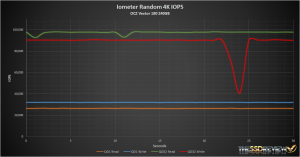Iometer is an I/O subsystem measurement and characterization tool for single and clustered systems. It was originally developed by the Intel Corporation however, they discontinued work on the program. In 2003 it was re-launched by an international group of individuals who are now continuously improving, porting and extend the product that is now widely used within the industry. This is a very powerful benchmarking tool and we are just now starting to integrate it into our consumer reviews. At this point in time we are going to be running a 4KB random workload at QD1 and QD32 to measure performance. After that we ran the another 4KB random workload at QD32 for 10 minutes to see how it would perform over a longer time span.
240GB
480GB
960GB
30 SECOND AVERAGE
Well, as we can see from the results Iometer gave us, the OCZ Vector 180 performs roughly the same over all capacities tested. All reaching about 97-98K IOPS read and 85-88K IOPS write. During 4K QD1 workload we see an average of about 27K IOPS read and 32K IOPS write. We can also see that after writing about 150GB of data half way through our 10 minute workload, the 240GB model’s random 4K write performance drops down to around 65K IOPS. The other capacities keep chugging along with constant performance.
We are also pretty sure some of you are wondering about all those inconsistent write values scattered everywhere as well as the dip you see during QD32 writes of the 30 second run. OCZ’s CTO Daryl Lang explained to us that this is normal and part of the firmware design. “The firmware is performing updates to its metadata mapping table and flushing the entire table out of DRAM and onto the NAND flash, during which I/O throughput is impacted for very brief periods. The metadata management is done on a frequent basis to prevent failure modes related to bricked drives as a result of metadata corruption, which can potentially happen on other non PFM+ enabled SSDs as a result of unexpected power loss. This phenomenon is visible only during synthetic benchmarks, there is virtually no impact to performance during real world use.”
We will see how this plays out during our PCMark testing soon.
 The SSD Review The Worlds Dedicated SSD Education and Review Resource |
The SSD Review The Worlds Dedicated SSD Education and Review Resource | 


How long is it going to be before we forget-
“Friends DON’T let friends OCZ” ??????????
oh yeah, that’s so eighties…
PC Perspective threw an interesting monkey wrench at this device.
“With firmware 1.01 (current as of this writing), the Vector 180 halts every 20 seconds during sustained writes. TRIM operations also result in obvious stalls in subsequent host writes.”
Our final outlook of this SSD is determinate of all tests, the most demanding of which is PCMark 8. PCMark 8 puts the SSD through 18 hours of the most grueling activity, and well above consumer demands. The best part of independent testing is that there is always more than a single review to rely on. Obviously, we had a great respect for this SSD with the firmware on hand.
Why is the Mushkin Reactor in the consistency bandwidth charts with these drives when it is low to middle tier and the rest are top of the line ssds? Why not show the top of the line Mushkin Striker comparison instead?
I included the reactor to show a comparison to how an entry level SSD stands against the top tier SSDs. We also do not have a mushkin striker to compare.
Ok sounds good. Could you test an compare some of the new top brand ssds ? Mushkin Striker, Pny cs2111, Patriot Blaze, Corsair Neutron XT? I would like to see consistency bandwidth comparisons for these ssds. This way we can see how the new controllers stack up against each other. I hope you get some soon!
It is nice to see a company provide 3 different capacities to review at the same time.
The PFM is interesting but as stated it does not protect the data itself. You won’t have a bricked SSD but you’ll have corrupted data (and a full restore on your hands) if power is lost and the cache is holding write data. Supercaps are the only thing that will prevent that. Crucial showed that with the M500 series. Wish more companies jumped on that bandwagon.
How long will it take to forget-“Friends don’t let friends OCZ”